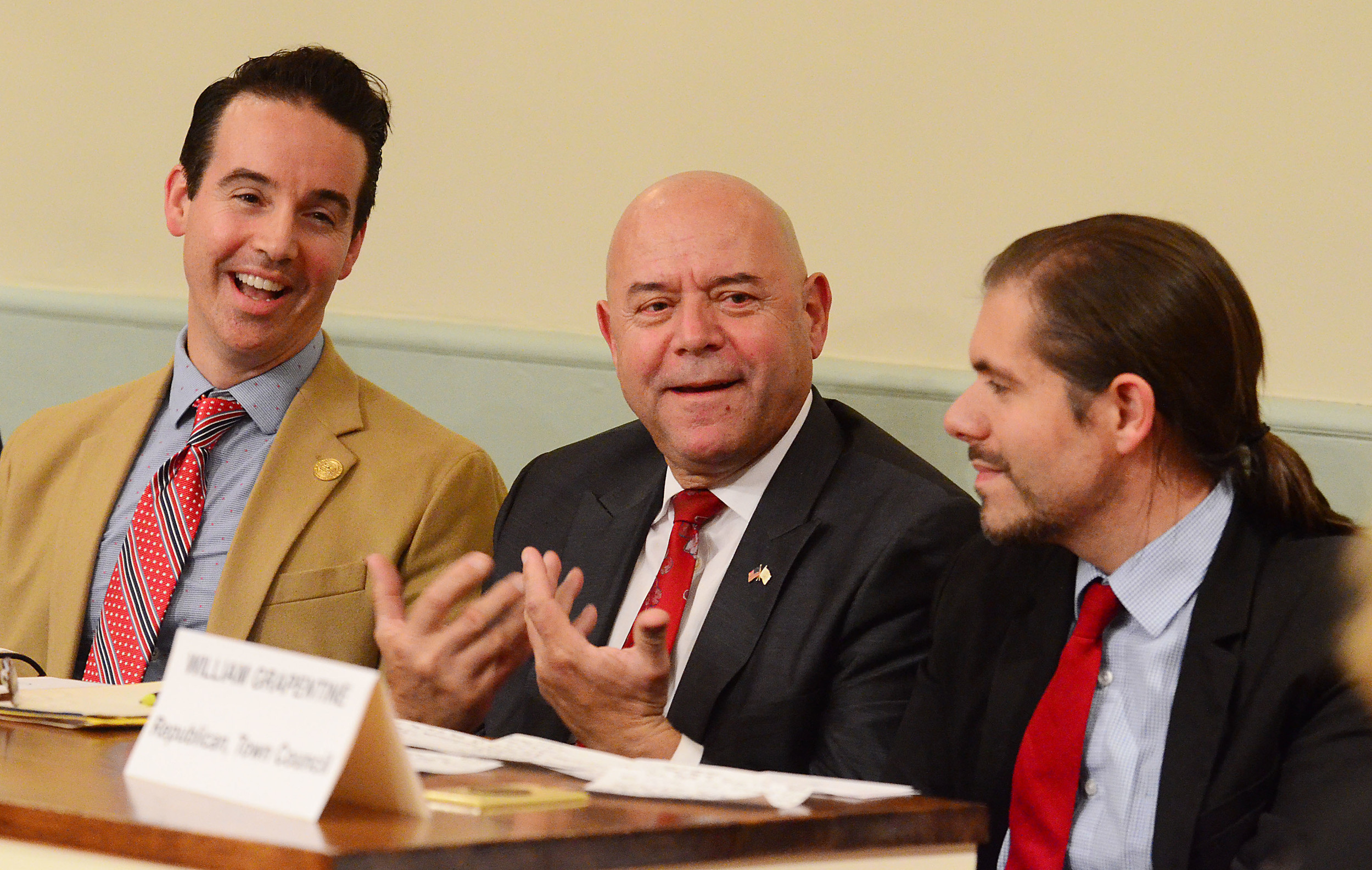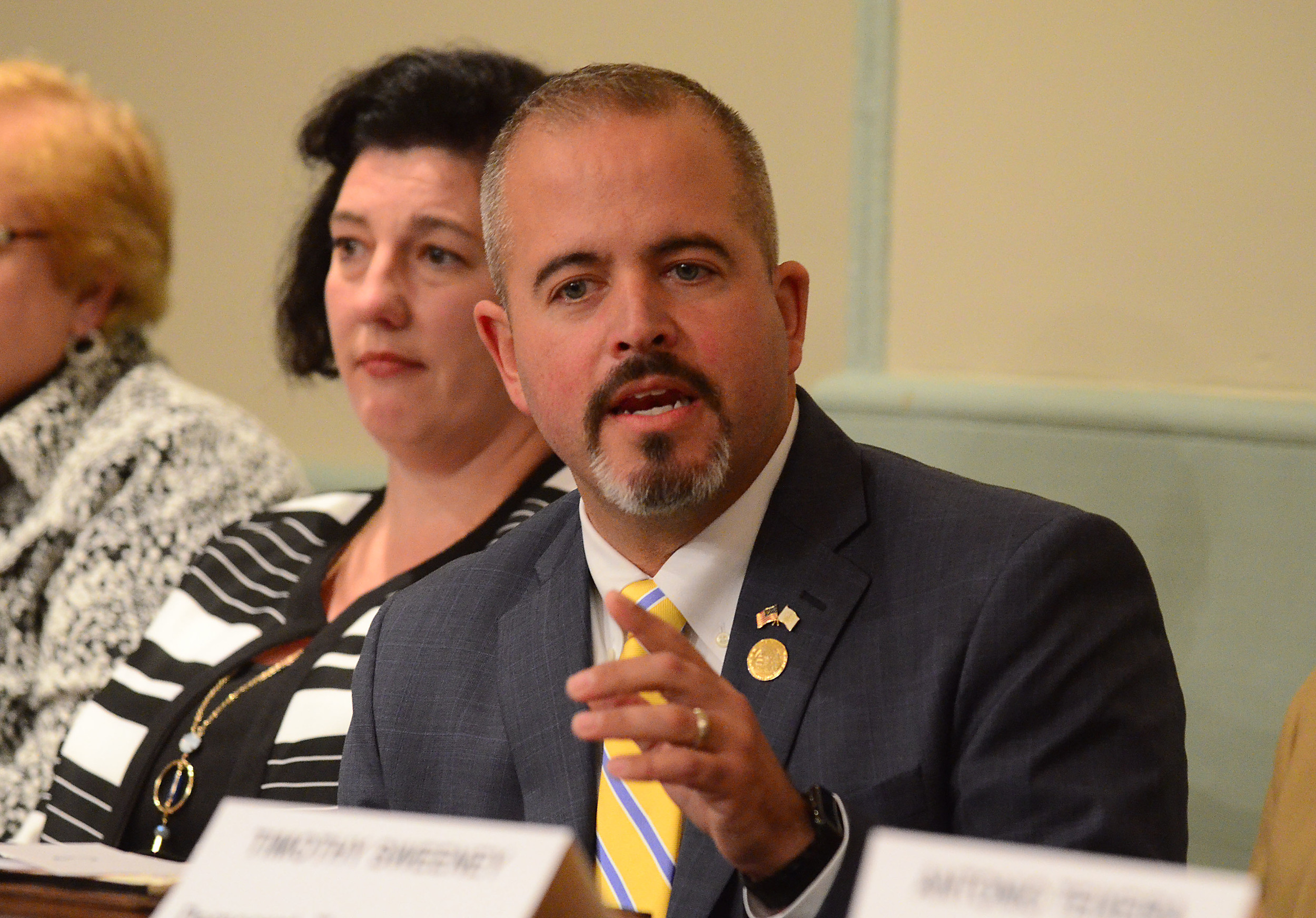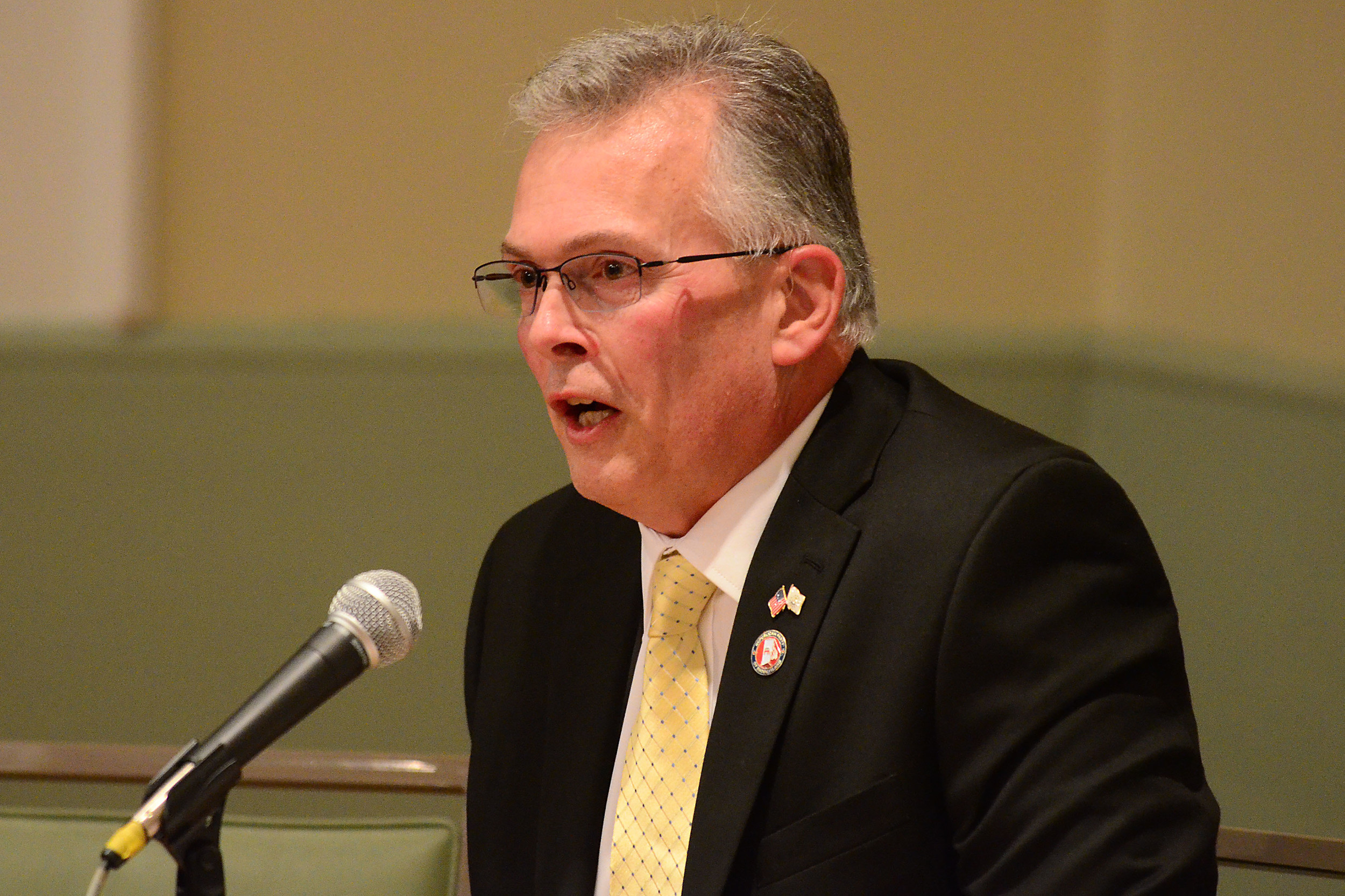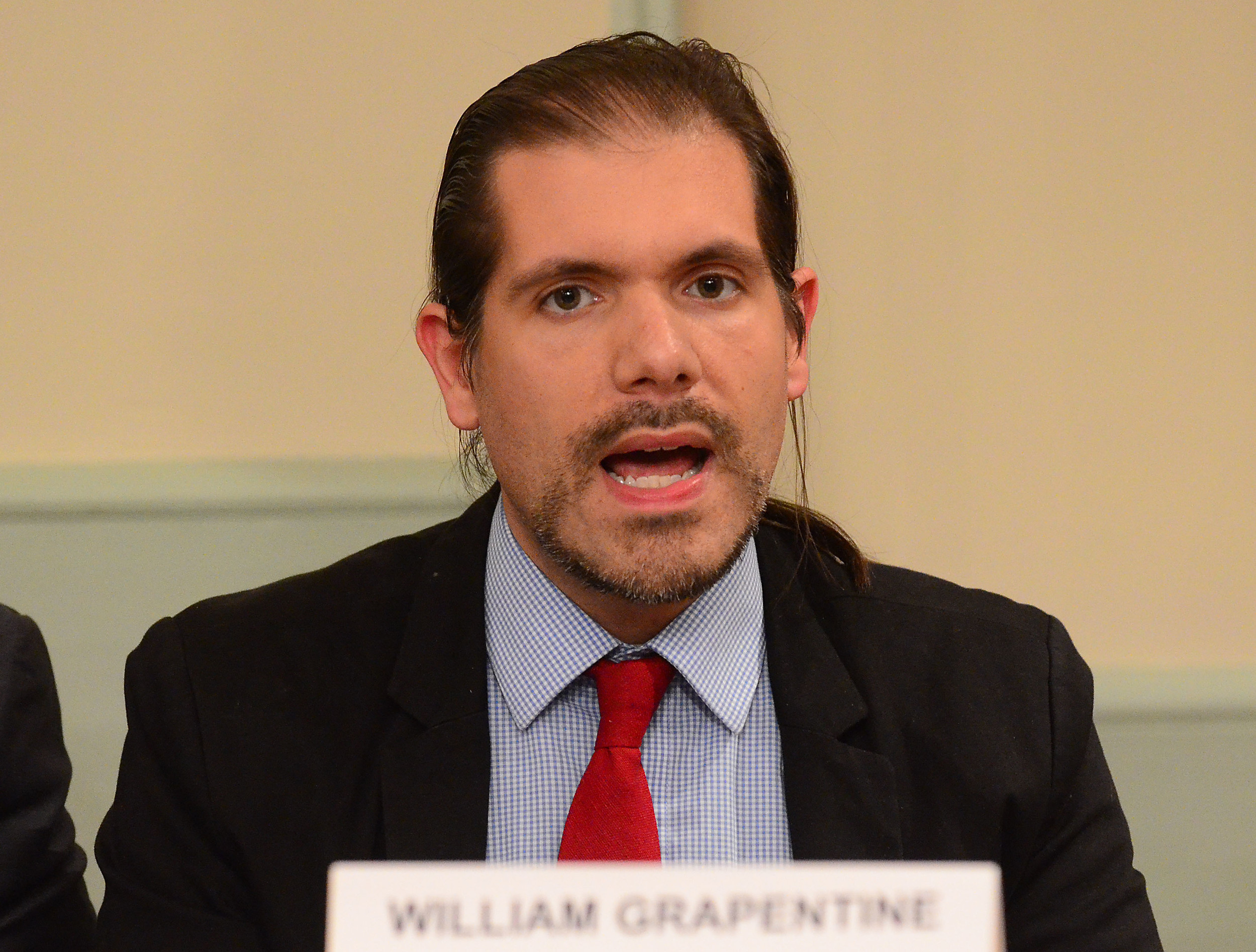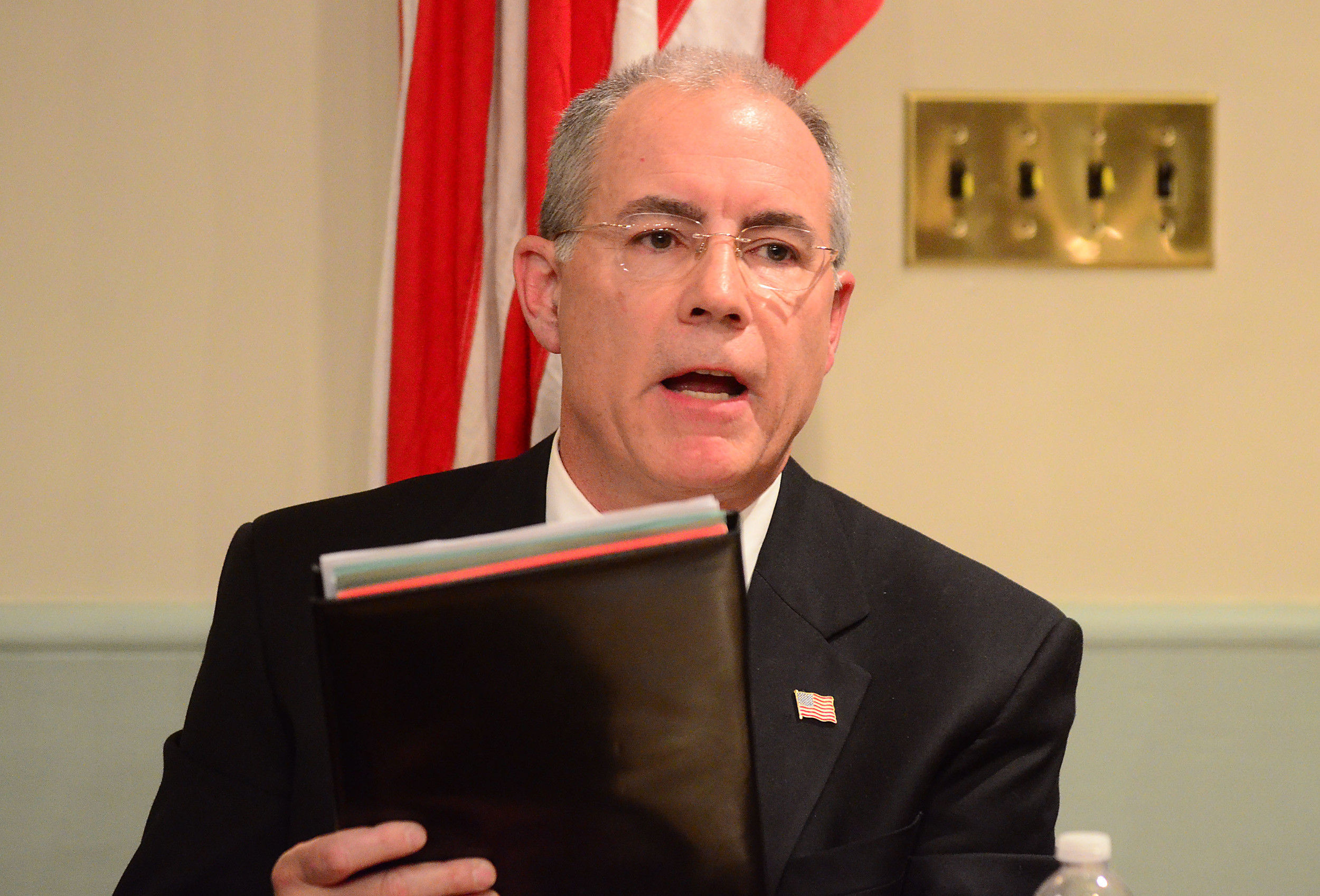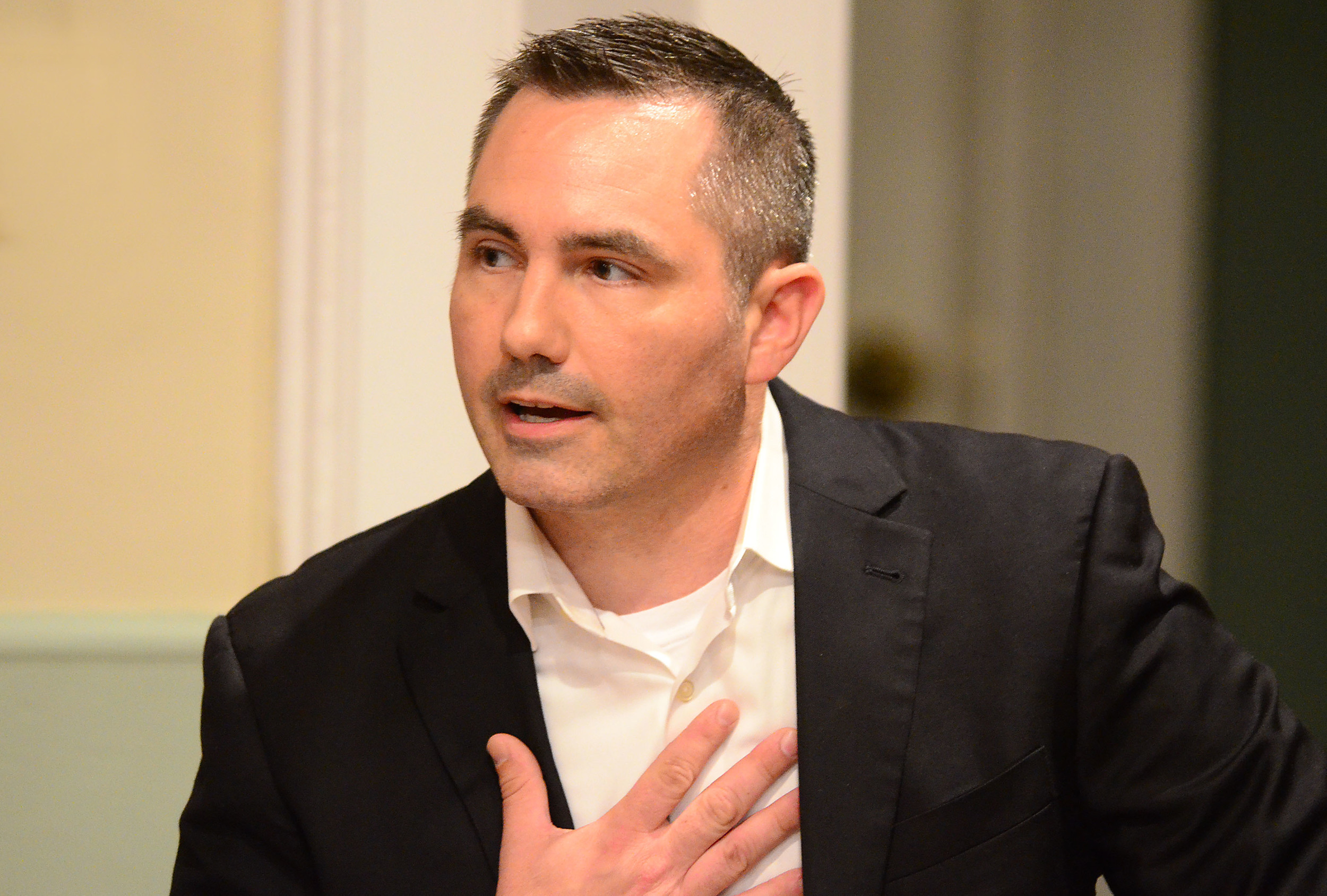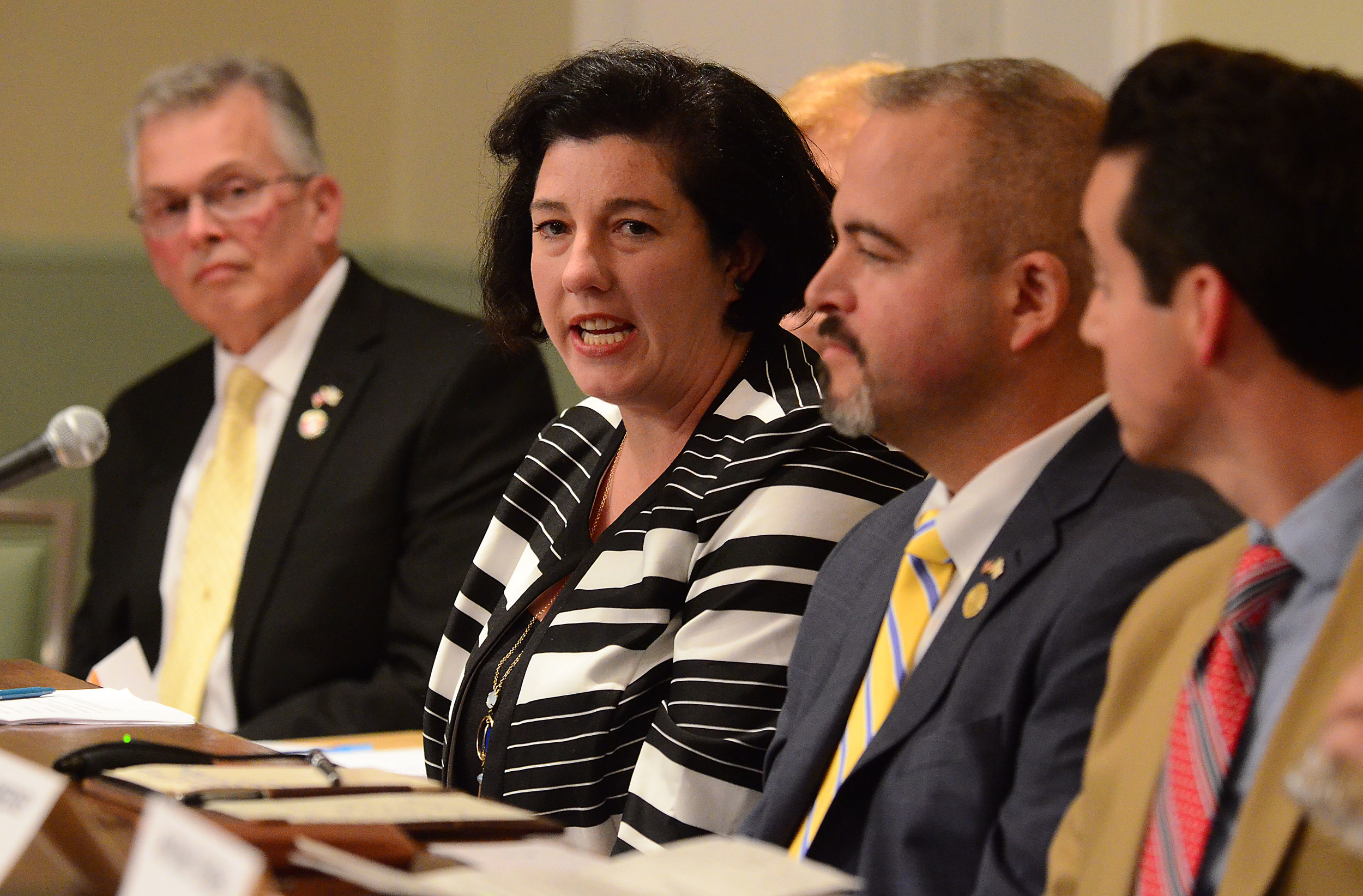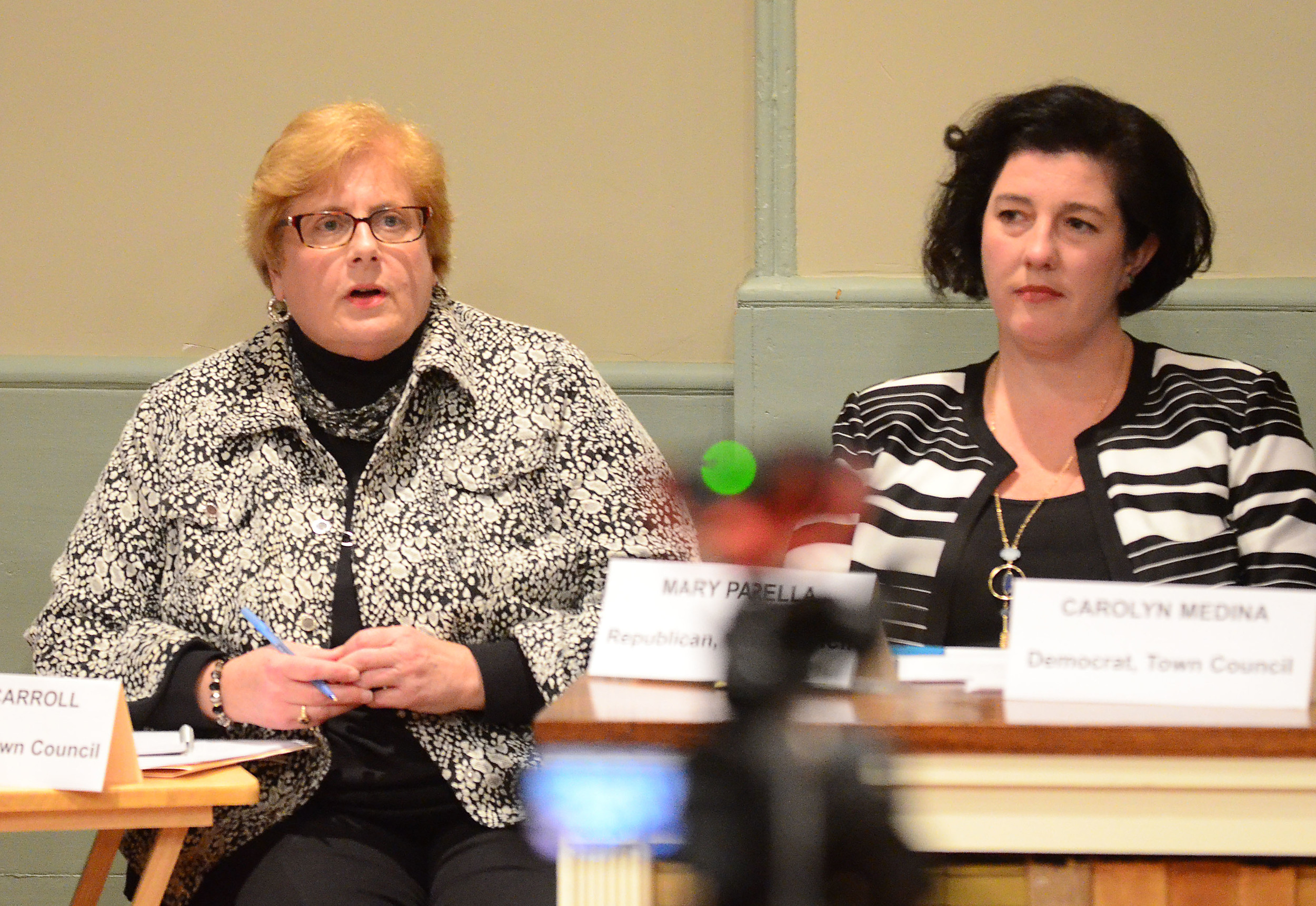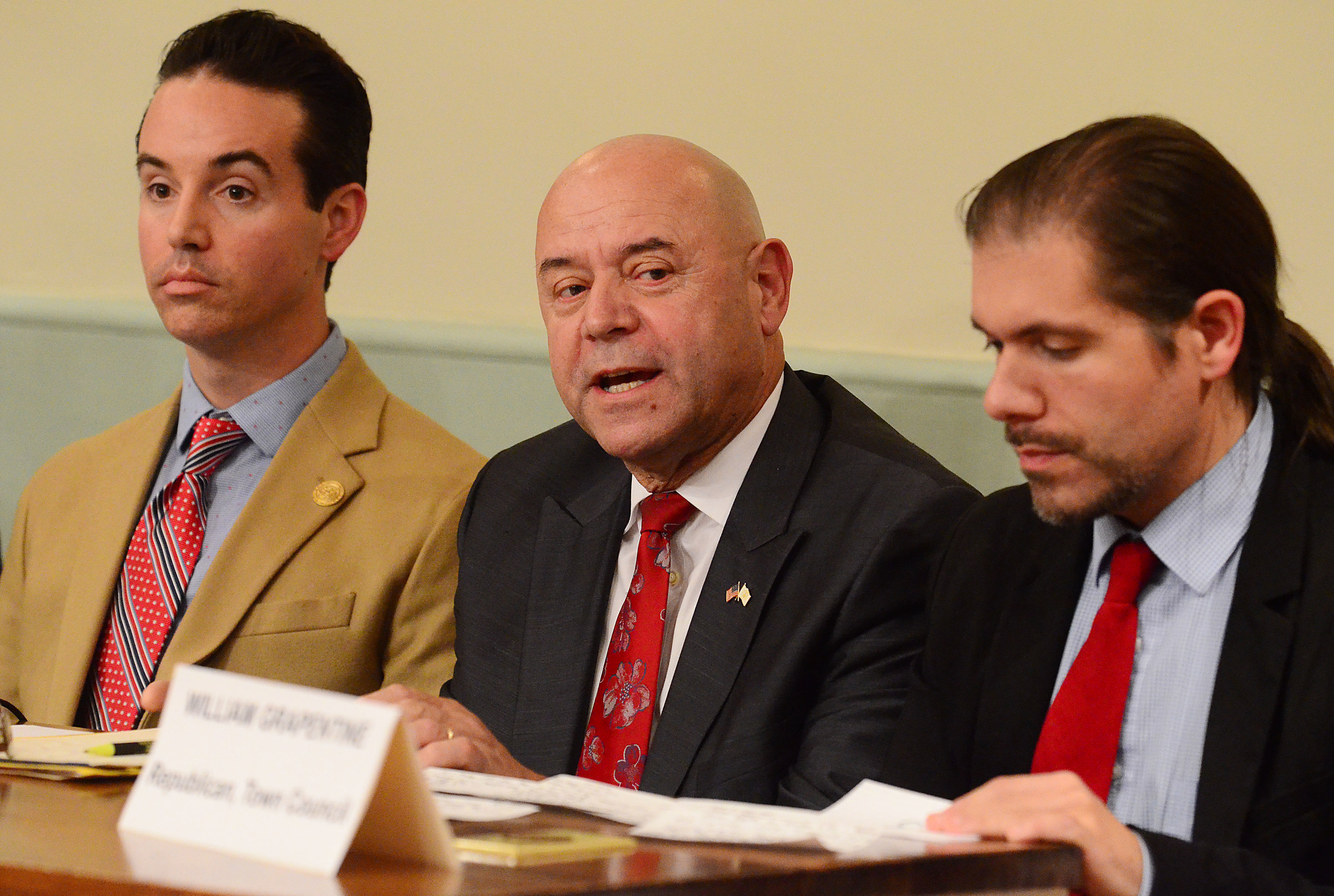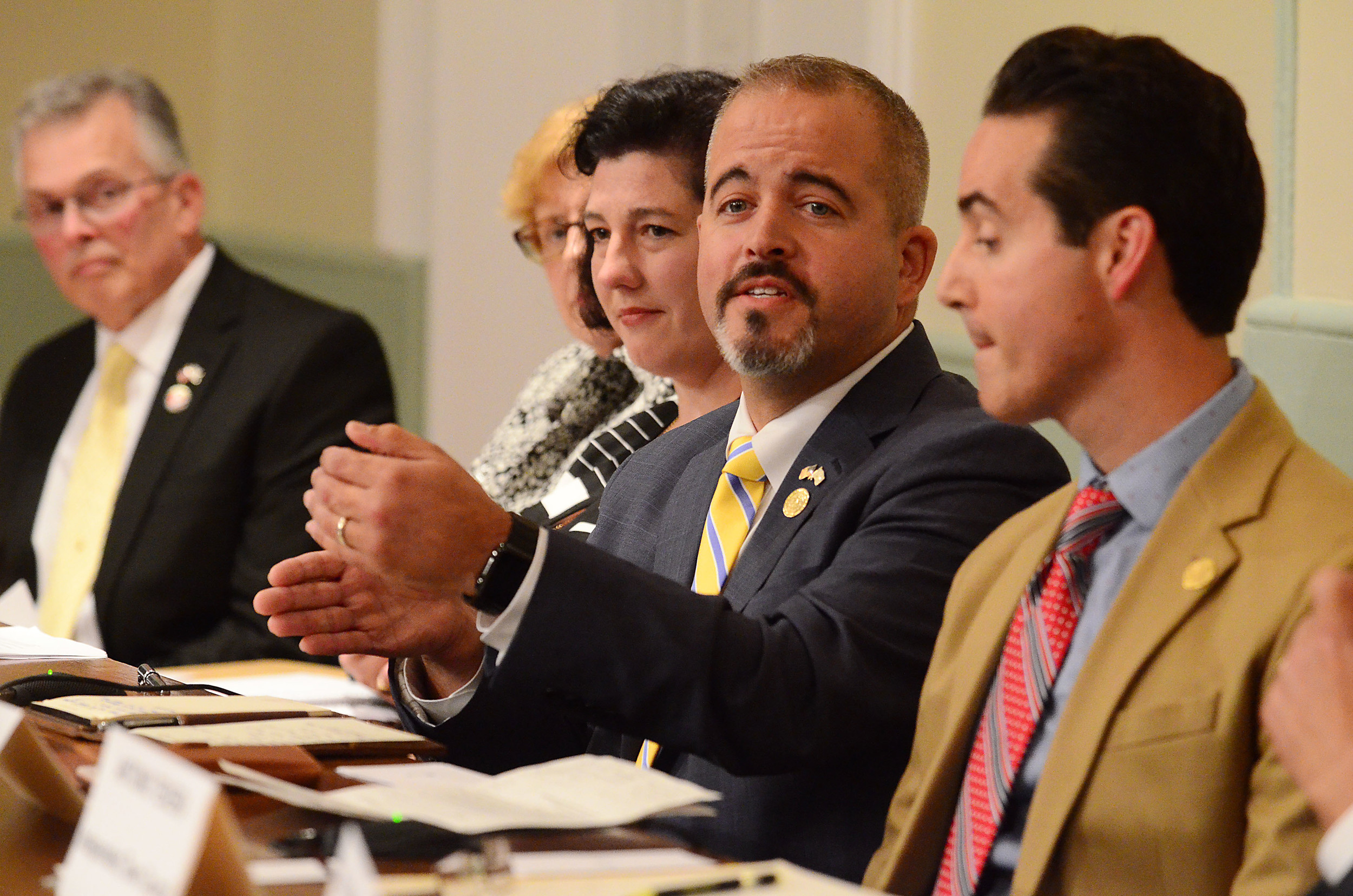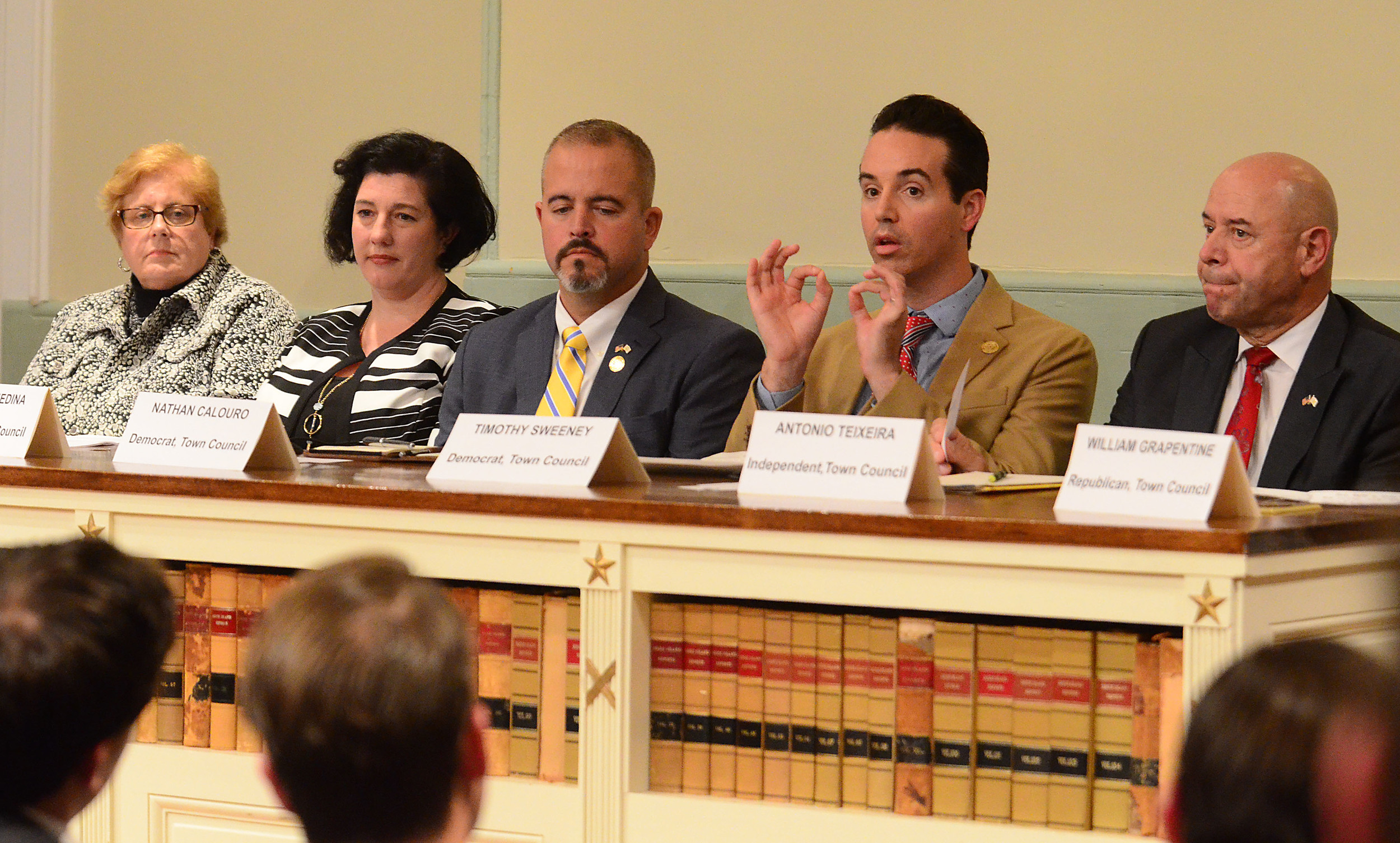- THURSDAY, MAY 2, 2024
Bristol council candidates face questions and each other
Candidates have some disagreements over plastic bag ban, economic development commission and marijuana
Nine of the 10 candidates for Bristol Town Council engaged in a civil discussion Tuesday night that touched on small businesses, plastic bags, government regulation, marijuana dispensaries and more, …
This item is available in full to subscribers.
Please log in to continue |
Register to post eventsIf you'd like to post an event to our calendar, you can create a free account by clicking here. Note that free accounts do not have access to our subscriber-only content. |
Day pass subscribers
Are you a day pass subscriber who needs to log in? Click here to continue.
Bristol council candidates face questions and each other
Candidates have some disagreements over plastic bag ban, economic development commission and marijuana
Nine of the 10 candidates for Bristol Town Council engaged in a civil discussion Tuesday night that touched on small businesses, plastic bags, government regulation, marijuana dispensaries and more, in a forum held inside the historic Bristol Statehouse on High Street. Sponsored by the League of Women Voters, the forum produced little actual debate, though a few of the candidates found opportunities to disagree with each other, mostly around actions taken by the current council.
Following are excerpts from the forum, which was moderated by East Bay Newspapers editor Christy Nadalin. Candidate Ethan Tucker did not attend the forum.
Working as a team
In his opening statement, Democrat Nathan Calouro talked about the national climate around politics and how things must be different at the local level. “I think Mary [Parella] captured it quite well when she talked about working together as a team,” he said. “Mary happens to be a Republican, and I happen to be a Democrat, but the day after the election, and quite honestly, right now, we work as a team. Because that’s what we’re supposed to do … I treat people with people with professionalism and dignity, and I think that’s important. I have a lot of people who come to me and say, ‘it’s tough out there right now; it does not feel comfortable.’ And I’m not talking locally, I’m talking about state and federal. We have an opportunity here to continue what we do … to treat people with respect and dignity and to get things done.”
Priorities for the Council
The candidates were asked about the priorities for the next council.
Republican Mary Parella talked about staying on track to finish projects already underway, like improving the town’s infrastructure, expanding the town marina and installing a solar farm at the former landfill. She added, “We have to keep our tax rate as low as possible while maintaining quality services. We have a beautiful community. People come to Bristol because it is a beautiful community, and we need to make sure that everyone can afford to continue to live here.”
Democrat Carolyn Medina talked about the importance of the Bristol Warren Regional School District. “It’s incredibly important that the public schools serve all the students and serve them with an appropriate education no matter what their level is. We need to serve the highest-performing students, we need to provide special ed. services for the students that needs those services, and we need to meet the needs of the kids in the middle, so that nobody falls through the cracks. I think supporting the school committee on education is one of the most important issues for this council.”
Democrat Aaron Ley, a professor at the University of Rhode Island, talked about his experience with workforce development initiatives. “We need to start luring more talent into some of these areas, because there’s a significant number of skills gaps, in places like Bristol, in the marine trades industry and the aquaculture industry, and areas like that. So one of the things I would like to do is find ways to make housing affordable for people who want to live here, and to find some way that our transportation meets the needs of the people who are trying to live here and the talent that we’re trying to lure here."
Republican William Grapentine said, “My family opened one of the first video stores in Bristol back in the ’80s, so I know what it’s like to run a small business. I can tell you that right now, Bristol has major issues for small businesses, like too much regulation … we need to get rid of the tangible tax, where recently there was a workshop on, but nothing has been done to make a more pro-small business community going forward.”
Responding to the criticism that Bristol is not business-friendly, Democrat Timothy Sweeney said, “On the council, we have been very strong on business. We have made sure that any type of plowing or trees or any types of issues that prevent or inhibit businesses from growing or doing business, we have made sure we have streamlined them … We need to make sure that businesses have the tools they need to be successful.”
Independent candidate Antonio “Tony” Teixeira said, “I’ve had the opportunity during the last two years, to observe many initiatives started during my administration come to fruition. But more needs to be done to generate revenues and reduce expenses.” He went on to talk about how the needs of seniors is a top priority for him, including issues like transportation and housing.
Growth and development issues downtown
Mr. Ley said, “One of my favorite classes in high school is shop class, and there’s an old adage that you measure twice and you cut once. I believe this question has to do with the Belvedere project downtown … We have to be very careful about having a debate about that type of development in our town. We should be having a robust debate about what’s going on, especially in the historic downtown.”
Elimination of the Economic Development Commission
Mr. Sweeney said, “We eliminated it, because we felt it was a board that wasn’t really moving the needle too much. And we felt that an economic development coordinator would be more of a better suited position to move that needle. When we look at economic development, we’re not just looking at downtown. We want to make sure there are complete streets, that are walkable, that things are easy to go to … and we felt that the trajectory and points that we were trying to move that board to, weren’t really working.”
That answer did not sit well with Republican Patrick “Pat” McCarthy: “I served on that commission for many years, and this explanation does not satisfy me. By the way, the economic development commission is the place where the largest economic development project in town is about to get underway. That’s our marina expansion project. The economic development commission has been around since at least the 1980s … Most of Rhode Island’s cities and town, more than two-thirds, have, in one form or another, a standing economic development commission. For me, that lack of transparency is troubling. I believe citizens should be involved. I’m in possession of a bachelor’s degree in economics from the University of Rhode Island. I was happy to serve. I was happy to lead and initiate several ideas to the town council. Some were accepted. Some were rejected. I would propose, should I be honored with your vote, to reinstate that economic development commission immediately.”
Licensing cannabis shops in Bristol
Mr. Teixeira got this question and joked, “I don’t even know what that is!” He went on to say it is something the council would have to study, when or if the state legalizes it.
Mr. Calouro jumped into the marijuana discussion by saying, “The state let us down. They passed a law saying it is legal for medical marijuana, but they gave us no tools. I’ll give you a couple of examples. State police are the ones who know where these facilities are, but our local police do not necessarily know where they are.” He went on to say that legal marijuana grow facilities have high electrical demands, yet there are no regulations or oversight of these sites.
“It needs the correct system to be in place. It needs to be done correctly. And I don’t believe that’s too much regulation, it just needs to be done correctly,” Mr. Calouro said.
Mr. Grapentine added, “If it’s so contentious, why not put it to a ballot issue? And by the way, studies have shown that marijuana is no longer the boogey-man gateway drug it once was. Opioids are the crisis now.”
Ms. Parella said, “It’s a little bit premature” for the council to consider it. The town would have to wait to see what law, if any, the state passes, and then react to it.
Community involvement
Mr. Grapentine talked about his 12 years of civic activities, including his role in the Bristol Christmas Festival Committee and St. Elizabeth’s Church. He then added, “I have recently completed a master’s in justice studies at Roger Williams University. I know research. I know data. I want to use my instincts and apply research to bettering the Town of Bristol. So that’s what I bring to the table.”
Mr. McCarthy talked about his role organizing and leading a grassroots group known as “BOOM” — Build Our Ocean Marina — “organizing the 125 Bristol residents waitlisted waiting for the marina expansion to happen. We brought together citizens from all across this town, with a common interest and a common desire to see our marina expanded. We notified and encouraged the Bristol Town Council to move forward on that initiative, and today I’m proud to say that it is well underway, with potential occupancy in 2020.”
Helping small businesses
Mr. McCarthy said, “I believe I’m the only candidate here who has actually put my capital at risk and purchased a failing small business here in town. This was some years ago. Times have indeed changed, but at the time, we did have struggles with the town council at the time, looking for relief, perhaps an investment by our company and a tax abatement for a while. That was not well received by the town council. But tax policy is really the place where we can help small businesses grow and be attracted to Bristol.”
Mr. Grapentine cited the town’s recent ban on plastic bags as an anti-business initiative. He called it a “good intentions but bad outcome.” He said, “It was very popular throughout the East Bay and Aquidneck Island, but people may go to Massachusetts to shop, just to get their plastic bags. Things like that, regulations like that, the town needs to look at going forward.”
Ms. Medina, a land use attorney, talked about her profession. “I’m a solo practitioner. I have my own business. It’s not a large business, but it is a business. My husband also works in town. He’s self-employed. That’s also a business. We understand what it’s like to be a small business, and to work from home, and there are more and more people in town working from home. That’s a form of business here in town that we also need to support.”
She continued, “I think that our harbor is one of our most important assets, and I think supporting marine-based business is crucial to a town like Bristol, where our harbor is more than half of the square footage in our town, and it is our most valuable asset, and it’s irreplaceable … Like Mary [Parella], I attended the Explore Bristol annual meeting yesterday, and there were lot of great ideas about how to foster tourism, how to support our hotel, how to bring additional accommodations, whether they be downtown or in other parts of the town … there are so many opportunities to support businesses in town. I think there is a ton of potential.”
Plastic bag ban
Mr. Sweeney defended his council’s plastic bag ban: “The public wanted this ordinance,” Mr. Sweeney said. He talked about surveys and research done in collaboration with RWU students and said, “We looked at how many plastics bags are rolling up on our shores. Thousands of plastic bags. And these bags break down into small, little plastic fibers, and they get into the fish, and then you ingest them. So there’s a health initiative here. So it’s sometimes our role to look at the big picture, and that was our objective here.”
Mr. Ley chimed in as well: “We just can’t count on our national politicians any more to pass laws to protect our environment. So one of the things we have to do is start acting locally, by doing things like passing plastic bag bans. So it has to be done at the local level, because we can’t count on our national politicians to get the job done anymore, and even if we can, they’re going to probably screw it all up anyway.”
Business experience
Mr. Carroll talked about his profession and background. “I’m a proven leader,” he said. “Every organization I’ve been a part of, I’ve either been a president or a chairman … I believe I know how to run a business, and I believe that running a town is like running a business, and I believe that I can bring those talents that I’ve acquired to benefit the town of Bristol … I have the heart and the desire to be a public servant for the town of Bristol.”
Other items that may interest you

